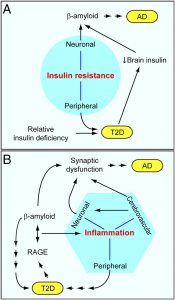Uncategorized Thursday, 2018/08/09
Johnson & Johnson recently announced that the company has stopped a clinical trial of a new Alzheimer's disease drug due to certain safety issues. This is another failed clinical trial following the announcement of several large clinical trials that have no effect in treating Alzheimer's disease. More and more failure cases tell us that we need to stop and think about how we could find the cause of Alzheimer's disease.
In the first analysis of the disease, Doctor Alois Alzheimer from Germany found that some strange changes occurred in the brain of patients who died of this disease. He did not find two types of protein accumulation in the brains of young people, namely plaques that exist between brain cells and tangles inside brain cells. In later studies, the researchers found that the protein composed of plaque is an amyloid, and the tangled protein is the tau protein. While researchers are still arguing about its specific structure.
Early warning Scientists working on Alzheimer's disease believe that they should not be anxious to conclude that these proteins cause disease. But unfortunately, scientists have discovered through research that these proteins can indeed induce Alzheimer's disease. One of the problems is that in a scientific experiment, if the theory is correct, the researchers can't test it, and only in recent years have scientists developed techniques to detect what these proteins can do, for example, researchers have studied genetically engineered mice and found that accumulate human amyloid in the brain may cause symptoms of mild brain damage. But the pharmaceutical industry long thought that amyloid was the chief culprit in the induction of Alzheimer's disease, and since then researchers have begun to look for Alzheimer's disease therapy.
The purpose of developing related drugs is to reduce the level of amyloid in the brain of the patient, either by slowing the rate of protein formation or by removing the protein from the brain. Both methods have been tested several times and different techniques and drug types have been used, however, none of these tests have shown any therapeutic effects, and some large pharmaceutical companies, including Pfizer, have completely abandoned research in this area. Subsequently, a series of new drugs have failed in the treatment of Alzheimer's disease, probably because amyloid may not be the culprit in the induction of Alzheimer's disease, so some companies have targeted their targets to tau protein. Some pharmaceutical companies speculate that a single protein is a chief culprit in inducing Alzheimer's disease.

Promising new method Maybe we need to rethink Alzheimer's disease. One way is to find genes that increase the risk of this disease. However, the problem is that the researchers have found very few genes, and it can be said that it is very rare. Alzheimer's disease does not seem to be induced by genetic mutations, so this approach may not clarify the mechanisms behind the disease.
Another option is to look for individual risk factors for Alzheimer's disease. One of the factors is type 2 diabetes. Obviously, diabetes and Alzheimer's disease are very different, so what is the relationship between the two? In diabetic patients, insulin does not effectively control the body's blood sugar levels, but insulin not only controls blood sugar, it also functions as a growth factor, on which the neuronal cells are depended, and if sufficient growth factors are not available, the neuronal cells will die.
The lack of insulin growth factors in the brain seems to make neuronal cells sensitive to stress and also reduce the brain's ability to repair neurons. When the researchers analyzed brain tissue from patients with deceased Alzheimer's disease, they found that the insulin in these patients had lost its role as a growth factor, even in some non-diabetic patients. Studies have shown that diabetes drugs may be an effective treatment for patients with Alzheimer's disease, and in some clinical trials, researchers have also made some impressive research results in animal experiments.
After drug testing of animal models of Parkinson's disease, the researchers also found a very impressive effect, and two of the clinical trials conducted in the body of patients with Parkinson's disease found that these drugs showed a protective effect. In a preliminary study, the researchers found that patients who received Parkinson's disease therapy deteriorated rapidly, but patients who received diabetes medication did not change their condition for two years. In another clinical trial, the researchers conducted a 12-month study and found that the patient's condition did not worsen in the drug-treated group.
Observing any protective effects in the brain of a patient in a clinical trial may be a completely new result, and it also supports a new research theory that the onset of Alzheimer's disease and Parkinson's disease is partly due to the lack of growth factor activity in the brain of the patient; these new theories may help researchers to clarify the molecular mechanisms underlying the disease, and also help researchers develop effective treatments for Parkinson's disease and Alzheimer's disease.
Reference
- Janssen pulls plug on Alzheimer’s candidate
- Alois Alzheimer
- APP mouse models for Alzheimer's disease preclinical studies
- Genetics of Alzheimer’s Disease
- Epidemiology of Alzheimer Disease
- Demonstrated brain insulin resistance in Alzheimer’s disease patients is associated with IGF-1 resistance, IRS-1 dysregulation, and cognitive decline
- Novel dual GLP-1/GIP receptor agonists show neuroprotective effects in Alzheimer's and Parkinson's disease models.
- Exenatide once weekly versus placebo in Parkinson's disease:A randomized, double-blind, placebo-controlled trial.
- Alzheimer’s disease: why insulin is a new suspect
